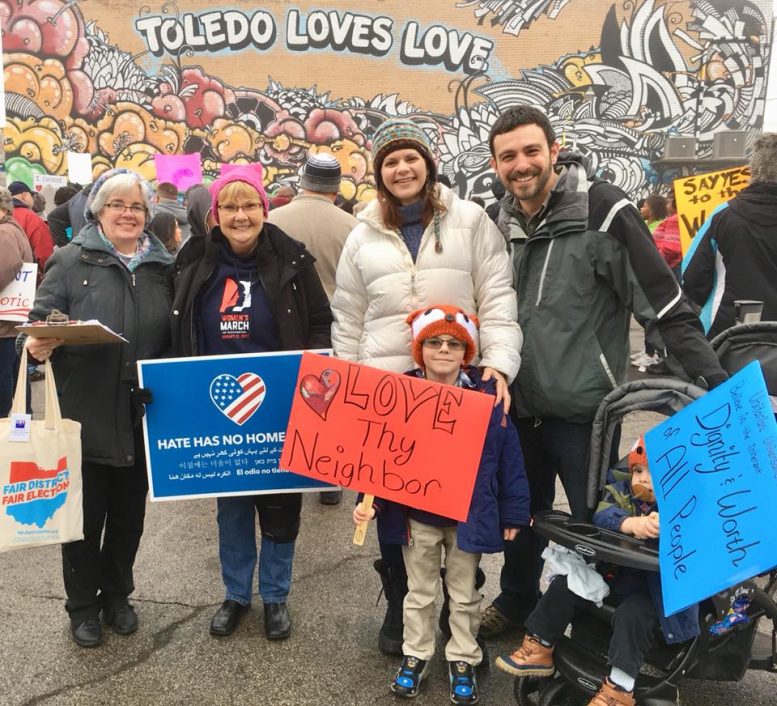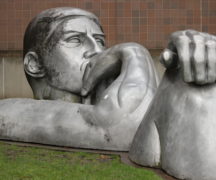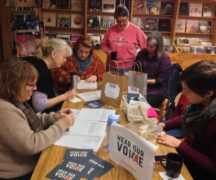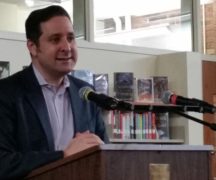By JAN LARSON McLAUGHLIN
BG Independent News
Andrea Killy-Knight would rather not have to march again next January.
“I hope I don’t have to put on my ‘Nasty Woman’ shirt and wave my same signs next year,” Killy-Knight said after this year’s Unity March in Toledo on Sunday.
But if she has to march, Killy-Knight and many other Bowling Green residents will put on their pink hats and their walking shoes. “I’ll do it again next year. But I hope the circumstances are different,” she said.
Sunday’s march was the second for many local residents who peacefully protested everything from women’s rights to immigration wrongs.
For Killy-Knight, who marched in Ann Arbor, Michigan, last year, that meant re-enlisting her sign from a previous rally that read “Your silence will not protect you.”
“It was funny, in a disgusting way,” that the signs from last year were still applicable for this march, she said.

Andrea and September Killy-Knight at march
Sandy Rowland was also in Ann Arbor last year and Toledo this year. “There’s still a big need to let government know that we have a voice, and we have needs that need to be filled,” she said.
Armed with her sign that said, “Hate has no home here,” Rowland said this year’s march may not have been as thrilling as last year – but it was a clear sign of unity and strength.
“It was very rejuvenating,” she said. “Women have their place. They have their rights.”
Joining in the march were also many men and families with children – numbering close to 1,000. “It was a great unified voice,” Rowland said.
Maria Simon made up for missing last year’s march by joining in the event on Sunday.
“I was at a conference in Atlanta last year,” she said. “It was hard to not be in solidarity with everyone. That’s one of the reasons I really didn’t want to miss this one.”
Simon donned her pink hat, and carried her sign stating, “Make America Proud Again,” and “Power to the Polls.”
Her favorite sign at the march read “Also, everything else.”
“That sign says it all,” Simon said. “The list of grievances goes on and on. There were a variety of people and a variety of issues.”
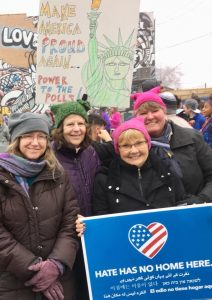
Bowling Green residents Lucy Long (left), Sandy Rowland and Maria Simon (on right) join march
For many marchers, it was their first time taking a political stand.
“A lot of men said they were marching for their mothers,” Simon said. “I felt like I was not just marching for myself, but in solidarity with women.”
Though rejuvenating, Simon also felt the frustration of those who had marched last year and decades ago for women’s and civil rights.
“I thought we were done with this,” she said. “We really have to keep getting out on the streets and make things clear and keep listening. We want to communicate that change is coming, but maybe not soon enough.”
Erin Hachtel also missed last year’s marches because she was teaching. This year, she brought her 15-year-old daughter to participate.
“I really wanted to be a part of getting people interested in justice on a lot of levels,” like economic, race and gender, Hachtel said.
Her daughter, who is in the Bowling Green High School musical “Newsies,” made a sign with lyrics from the show stating, “Wrongs will be righted if we are united.”
“She wanted to share a message of being united and working together for good,” Hachtel said.
Hachtel was particularly impressed that the march organizers allowed young participants to take the lead. “They stepped aside so the teenagers could lead the march.”
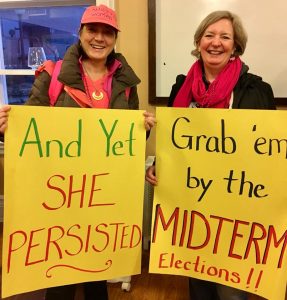
Debra Nicholson (right) holds sign on Sunday.
Debra Nicholson attended the march in Ann Arbor last year, and felt the tug to do the same in Toledo this year.
“It just seemed that the situation is obviously ongoing,” she said. “It seems like things are worse than we could have imagined.”
Yet, the marchers persisted.
“People are still engaged, they are still determined to take a stand,” Nicholson said. “It did feel like there was a sense of solidarity and moving forward.”
Killy-Knight wasn’t about to stay home either.
“If they are counting, I want to be a number,” she said of the march tallies. “It was pretty impressive. Every age was there, every demographic. It was moms and their kids, and families, and grandmas. It was an affirmation that this is important.”
Lee McLaird, past president of the League of Women Voters of Bowling Green, was at the march on a mission. She was promoting fair district lines and collecting signatures for an anti-gerrymandering petition.
“I think it’s good people are still willing to march. That means you still have enough energy to keep after politicians,” McLaird said.
But the question remains – were the politicians listening?
“Our course, Trump wasn’t listening,” Rowland said. “Do I think Bob Latta listened? No. Do I think Rob Portman listened? No.”
Rowland, a member of Bowling Green City Council, was particularly critical of Latta for not responding to his constituents. “It seems like nothing can penetrate Bob Latta,” she said. “At the same time, the city he lives in is working on being a more welcoming town. He’s not every representing his town.”
Killy-Knight shared some of those concerns.
“When someone doesn’t want to hear, you are like a mosquito buzzing in their ear that they swat at. Sometimes I feel like that,” she said. “But we are being heard, even if it’s not making it to the desk of the people in power.”
Simon said the atmosphere surrounding Sunday’s march carried its own message.
“It was very peaceful. We are trying to be civil,” she said. “Our president and the people supporting him are diminishing our standing in the world.”
The march was sponsored by the YWCA, and welcomed by Trinity Episcopal Church which provided food, music and social services to those attending. One of the most emotional moments of Sunday’s event occurred as marchers approached the church, Nicholson said.
“As we were walking up to the church, the bells were pealing,” she said.
“It was definitely foggy, but our message was clear,” Simon said.

